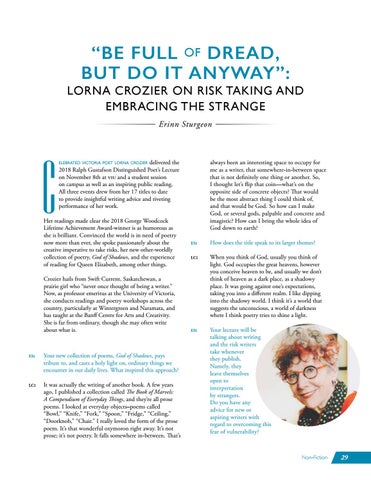“BE FULL OF DREAD, BUT DO IT ANYWAY”: LORNA CROZIER ON RISK TAKING AND EMBRACING THE STRANGE Erinn Sturgeon
C
delivered the 2018 Ralph Gustafson Distinguished Poet’s Lecture on November 8th at viu and a student session on campus as well as an inspiring public reading. All three events drew from her 17 titles to date to provide insightful writing advice and riveting performance of her work.
always been an interesting space to occupy for me as a writer, that somewhere-in-between space that is not definitely one thing or another. So, I thought let’s flip that coin—what’s on the opposite side of concrete objects? That would be the most abstract thing I could think of, and that would be God. So how can I make God, or several gods, palpable and concrete and imagistic? How can I bring the whole idea of God down to earth?
ELEBRATED VICTORIA POET LORNA CROZIER
Her readings made clear the 2018 George Woodcock Lifetime Achievement Award-winner is as humorous as she is brilliant. Convinced the world is in need of poetry now more than ever, she spoke passionately about the creative imperative to take risks, her new other-worldly collection of poetry, God of Shadows, and the experience of reading for Queen Elizabeth, among other things. Crozier hails from Swift Current, Saskatchewan, a prairie girl who “never once thought of being a writer.” Now, as professor emeritus at the University of Victoria, she conducts readings and poetry workshops across the country, particularly at Wintergreen and Naramata, and has taught at the Banff Centre for Arts and Creativity. She is far from ordinary, though she may often write about what is.
ES:
Your new collection of poems, God of Shadows, pays tribute to, and casts a holy light on, ordinary things we encounter in our daily lives. What inspired this approach?
LC:
It was actually the writing of another book. A few years ago, I published a collection called The Book of Marvels: A Compendium of Everyday Things, and they’re all prose poems. I looked at everyday objects–poems called “Bowl,” “Knife,” “Fork,” “Spoon,” “Fridge,” “Ceiling,” “Doorknob,” “Chair.” I really loved the form of the prose poem. It’s that wonderful oxymoron right away. It’s not prose; it’s not poetry. It falls somewhere in-between. That’s
ES:
How does the title speak to its larger themes?
LC:
When you think of God, usually you think of light. God occupies the great heavens, however you conceive heaven to be, and usually we don’t think of heaven as a dark place, as a shadowy place. It was going against one’s expectations, taking you into a different realm. I like dipping into the shadowy world. I think it’s a world that suggests the unconscious, a world of darkness where I think poetry tries to shine a light.
ES:
Your lecture will be talking about writing and the risk writers take whenever they publish. Namely, they leave themselves open to interpretation by strangers. Do you have any advice for new or aspiring writers with regard to overcoming this fear of vulnerability?
Non-Fiction
29
